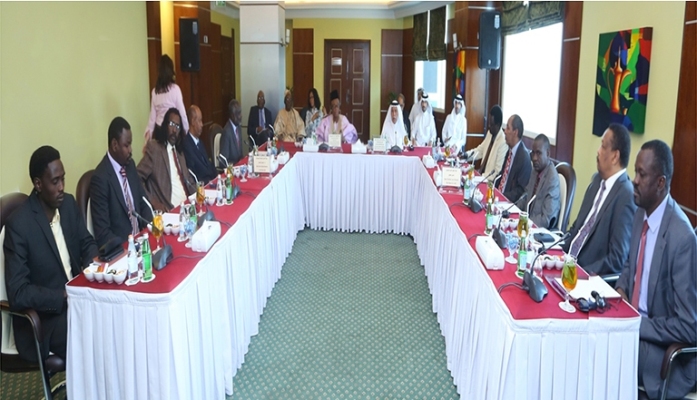Doha meeting seeks to reach common vision with Qatari mediation on Darfur :JEM
May 31, 2016 (KHARTOUM) – The Justice and Equality Movement (JEM) led by Gibril Ibrahim said the Sudanese government isn’t a party to the ongoing Doha consultations pointing the two-day meeting aims to reach a common vision with the Qatari mediation on the Darfur peace process.

On Monday, the Qatari Deputy Prime Minister Ahmed bin Abdalla al-Mahmoud and the Joint Chief Mediator Martin Uhomoibhi started discussions in Doha with the JEM and the Sudan Liberation Movement (SLM-MM) led by Minni Minnawi on ways to join the Doha Document for Peace in Darfur (DDPD).
“Talks with the two movements focused on the possibility of joining the peace process on the basis of the Doha Document for Peace in Darfur (DDPD) and the views of the two movements in this regard,” said a short statement released by the official Qatari News Agency (QNA).
In a press statement extended to Sudan Tribune on Tuesday, the chairman of JEM’s legislative council El-Tahir al-Faki declined to describe the consultations as “negotiations with the Sudanese government”, saying the aim of their visit to Doha is to explore the Qatari stance on the Darfur peace process and to arrive at a joint view.
He pointed that his movement and the SLM-MM met with al-Mahmoud in Paris last January at the request of the Qatari government to discuss Darfur’s peace, saying the two movements presented a joint position paper to the Qatari mediator on ways to achieve peace in Darfur.
Al-Faki said the paper pointed that the two movements are looking forward to finding “a serious partner to achieve comprehensive peace in Sudan and to help the Sudanese people avoid wars and realize stability and development”.
“The DDPD mustn’t be considered the reference for the talks whatever and Qatar mustn’t stick to the Doha forum and should become part of the African Union [mediation]” the position paper stated.
Last month, JEM leader told Sudan Tribune that they intend to ask Qatar for joining the African Union High-Level Implementation Panel (AUHIP) led by Thabo Mbeki in order to have a united framework for negotiating a number of issues on Darfur and the comprehensive peace in Sudan.
However, the Sudanese presidency quickly rejected the armed movements’ proposal describing it as “an attempt to circumvent the (AUHIP-proposed) roadmap which was not signed by the two armed movements”.
According to al-Faki, the position paper pointed that Qatar had monopolized the previous talks which led to the signing of the DDPD despite the presence of the former Joint Chief Mediator, Djibril Bassolé.
The DDPD was signed on 11 July 2011 between the Sudanese government and the Liberation and Justice Movement (LJM) of Tijani al-Sissi and the Justice and Equality Movement splinter faction led by Bakheit Abdel- Karim Dabajo (JEM-Dabajo) joined the deal on 6 April 2013.
He added that the position paper also rejected the participation of movements which have no weight on the ground besides “not allowing the ruling National Congress Party (NCP) to make use of the forum”.
“We are advocates of peace and if it wasn’t for us, the Doha forum wouldn’t have been created. We have offered valuable and precious [sacrifices to achieve peace] including offering of martyrs and on top of them the leader of the movement [Khalil Ibrahim]” he said.
The two groups call to open the DDPD for negotiations saying some issues were ignored or not fairly treated, but Khartoum rejects such request.
The Sudanese government proposes they sign the framework document deal stressing it deals with all their claims. After what, they have to discuss security arrangements agreement and join the national dialogue to discuss any further regional or national demands.
(ST)
